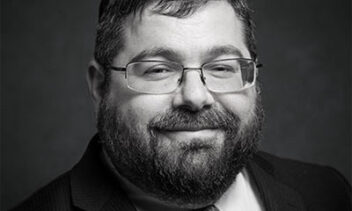Leah Forster plays with the essence and expectations of the people we love (and sometimes love to hate). Known widely for her Tichel Tuesday videos, in this week’s conversation with 18Forty, Leah talks about her struggles and successes, and how she maintained her incredible optimism through it all, available here. Read this Weekend Reader for a curated look at Leah’s interview, as well as a conceptual analysis of what makes Leah’s character comedy so funny.
Why should you listen to Leah Forster?
Listening to Leah, one could be easily misled. With her characteristic positivity and poise, she has a gift for making incredible challenges seem less daunting, softened with a laugh. Leah grew up in a Chassidic home, and became a popular performer in ‘by women, for women’ comedy routines. Traveling across the world while teaching in several Bais Yaakov high schools, Leah created a space for herself, and women like her, as an ultra-Orthodox female comedian. Although successful in her community, Leah ultimately made the decision to leave her ultra-Orthodox community, came out as a lesbian, and was prepared to never perform comedy again:
Leah Forster: The problem was that internally I was struggling with a lot of personal beliefs that didn’t align with the community that I was in, and ultimately I made the decision to walk away from it all. I was only able to do that, by the way, after many many years of help and courage and community and therapy, because it takes a lot when that’s all you have to walk away from. I will say that when I walked away, I was prepared to never make another joke in my life, because I didn’t know that I would have a second chance at life or another opportunity. When I ripped that band aid off, it was the final band aid that I took off, and I walked away. It was sad. It was a very sad time in my life, because I wanted to be authentic, and I also wanted to be able to make people laugh, but given where I belonged, it was impossible for me to do both.
As time went on, Leah found that the community she had left has changed, as the ultra-Orthodox community grows more open, its boundaries more porous. Inspired by the fashion bloggers, influencers, and other Orthodox social media personalities, Leah decided to return to comedic life, and began posting jokes on social media. Her infectious humor and spot-on inhabiting of hilarious characters gained fans, and she was soon a popular Insta-comedian. However, Leah later made headlines for different reasons when two restaurants that she had booked for an evening of comedy buckled under pressure from religious authority, and canceled her performance. Both were threatened with losing their Kashrus certification for hosting an openly lesbian comedian. Leah doesn’t blame the restaurants in question, and she is wary of the ways the media portrayed the incident. Eager to talk about the positive and accepting Jewish communities that have embraced her, as well as the one she now lives in, Leah looks back at this moment positively:
David Bashevkin: Did that dramatically hurt your ability to perform comedy inside of the community? Did you lose a lot of followers?
Leah Forster: Oh my gosh. Lose? My followers doubled in a day. And then my eyes really opened up to so many beautiful Jewish communities. This Chassidish rabbi from Washington DC called me up the next day and booked me for a show, and New Rochelle, and Great Neck, and Teaneck, and all of a sudden, all these people were reaching out to me and being like, “You’re a really good person, you’re a really good Jew. We want you. Come perform for us.” And I ended up getting so much more business and gigs from that experience, and it was the most positive…
Laughter with thought, laughter without thought, as long as we are laughing.
For many, if not most, facing the level of scrutiny that Leah faced would push one away, and lend the cynical edge to comedy that so many comedians wholeheartedly embrace. But, remarkably, not for Leah. Her deep sense of positivity and moral responsibility are empowering, and challenge listeners to find more empathetic joy in their own lives:
David Bashevkin: Do you feel like you’ve healed since that incident? Because again, what I find so remarkable, and I keep on coming back to this, is the resilience of your spirit, even given all of the headlines and scandal about it. Here we are two years later, you were on the front page of a major daily newspaper… I don’t sense the bite, I sense the regular Tichel Tuesday. You’re not coming after people still. So after this, what did you use to heal?
Leah Forster: I’m going to sound super preachy, but I really feel like you’re not a failure until you start blaming others for your mistakes. I could sit and point fingers all day, “My parents don’t accept me, and people in my community dump me,” I lost my job. Back in the day when I had left, and I became an authentic person, I got fired from one day to the next. I was outed. One of the schools that I worked for literally told me, “Don’t come in the next day.” And I was a teacher for many, many years, and my students loved me, and I gave my life to the job. Of course I was hurt, of course I was sad.
Resilience in perspective, and orientation towards growth and acceptance, does not come cheaply. This isn’t foreign to the comedian, and such resilience takes many forms. For Gary Gulman, finding meaning in adversity led to his comedic tour through depression and anxiety in The Great Depresh.
Leah found meaning in freedom from the labels that her comedy so often plays with:
David Bashevkin: Where do you find the strength for all of this? We spoke about comedy. Your relationship to Judaism, which has evolved so much, obviously where you’re coming from … Do you still find strength from Judaism even though so many of its strictures and boundaries have been the source of so much pain for you?
Leah Forster: Good question, and here’s the answer: The answer is, I personally don’t need to live by a label any more. Once I remove that from myself—When I grew up, the biggest threat my mother told me was, “You want to be considered modern?” “No! I don’t want to be modern!” Now it’s like, who really cares what people consider me? I have a relationship with God, and that’s it.
What makes Tichel Tuesday so funny?
George Meredith, the Victorian novelist and poet, wrote that the “test of true comedy is that it shall awaken thoughtful laughter.” An interesting term, “thoughtful laughter”. Is that laughter that provokes thought? Or is the laughter inspired by thought, the thought preceding? Or perhaps the two come together, a thinking laughter as the laugher laughs in thought. While dissecting humor may not make the funny funnier, it can make us laugh a more thoughtful laughter.
We often think about comedy as the art of the unexpected, the thrill of the upset expectation. Over the course of our lifetimes, we have come to learn sequentiality and order, and comedy is often thought in terms of upsetting these lessons with absurdity. But comedy sometimes plays to a different urge: The confirmation of that which we always knew, but could never explicate. Comedy thrives both in the “sudden glory” (Hobbes) of awareness of the gap between hope and history (Heaney) or “concept” and “real object” (Schopenhauer), as well as in the subtle joy of the idealized form of your own lived reality. Instead of upsetting expectations, character comedy invites laughter at the character that idealizes one type of person so well, so perfectly, that the character constitutes the platonic ideal of every person of that type. In character comedy, we meet the people we’ve always known, in their most comically heightened expression.
Leah Forster: Yeah. But what I wanted was—and this is the message I get all the time—”Oh my gosh, I know a girl like this.” Hadassah, the girl from Young Israel, baruch Hashem, I’m telling you, it’s such a bracha, you know? She’s that woman with the little doily on top of her head, you know what I mean? And then there’s the frum girl that just came back from seminary, and she’s devastated because her mother eats chalav stam. So I feel like people who watch it are like, “That’s my neighbor, that’s my sister, that’s my cousin.” And to me, when I do that character, I’m just joining in on the fun.
Like many comedic forms, this is a comedy within constraints. What makes this funny is that she sticks to the expectations and assumptions that we have about each figure. We aren’t surprised when Leah’s shadchan character thinks that “resume” rhymes with “boom” (“like I always say, a good shidduch resume will make your shidduch boom!”), we are delighted to have our expectations affirmed. Comedy within constraints refers not only to the expectations as to who the audience is, but to a sort of two-sided comedic covenant between the comedian and the audience.
John Fiske, a media theorist writing about genre, puts it this way:
A representation of a car chase only makes sense in relation to all the others we have seen – after all, we are unlikely to have experienced one in reality, and if we did, we would, according to this model, make sense of it by turning it into another text, which we would also understand intertextually, in terms of what we have seen so often on our screens. There is then a cultural knowledge of the concept ‘car chase’ that any one text is a prospectus for, and that is used by the viewer to decode it, and by the producer to encode it.
We laugh at Leah’s shadchan, dental hygienist, or Young Israel attendee because of the sum of our experiences and expectations about what these archetypes represent. Comedy imitates life and life imitates comedy, and yet life never seems to be quite as life-like as comedy makes it out to be. The shadchanim we meet in real life are never quite as shadchan-y as Leah’s shadchanim, the old Jewish grouches are never quite as old-Jewish-grouch-y as Larry David, the Old Jewish Grouch. The complexities of real humans confound our expectations. Character comedy draws upon our expectations about each other and lets us laugh out our repressed expectations about each other. If we can’t laugh at the shadchan before us, we can at least laugh at Leah’s hyper-idealized shadchan.
But Leah isn’t trying to inspire theoretical discussions or conceptual analyses; Leah is trying to make us laugh, and in that she succeeds. Laughter with thought, laughter without thought, as long as we are laughing.
Leah Forster: I want to be the face of where people turn on their phone in the morning with a cup of coffee, and they had a crazy day getting their kids up on a bus, and then they sit down, and they turn on my story, and they have a laugh, and their day starts with a smile. Or, I want to be the person that is stuck in quarantine, and they were supposed to have a birthday party, and they’re turning 85 years old in Australia, which just happened, and I was able to hop on a Zoom, and this woman watches my Tichels every week, and I was able to make her laugh, and she’s alone, surrounded by her kids on Zoom. That’s who I want to be. I don’t want to be a role model, meaning, I don’t want to teach anyone anything by preaching.
We end with Leah’s own words. What better way? Like everything else she does, her conclusory words are sensitive, sweet, and funny. Note to Reader: It is strongly recommended that you read these words with her voice in your head:
Leah Forster: Let me leave the oilam with a bracha: You should be with mazel and simcha, and laughter is the best medicine unless you’re laughing alone. Then you probably need medicine.
For more on this topic, visit 18forty.org/comedy








